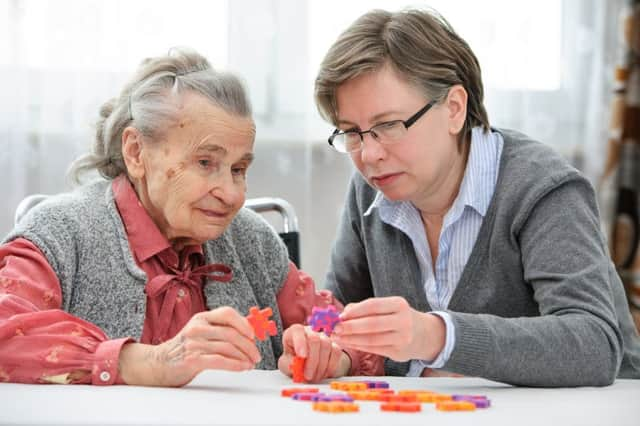Expert attacks '˜rush' to diagnose Scots with early dementia


Dr Peter J Gordon, a clinician with over 25 years’ experience, says pressure on NHS boards to meet incentivised targets known as HEAT Target 4 changed behaviour in the medical profession and has led to a breakdown in the provision of post diagnostic support (PDS).
He criticised so-called “Awareness” campaigns for creating a culture of fear in elderly people by only talking about dementia or Alzheimer’s and not about other reasons for memory loss as an inevitable part of growing old.
Advertisement
Hide AdAdvertisement
Hide AdIn one instance Gordon claims a psychiatrist in his area, who has since retired, re-diagnosed all patients with mild cognitive impairment as having early Alzheimer’s disease, following the introduction of HEAT Target 4.
The Scottish Government is now on its third dementia strategy. The first started in 2010 with the emphasis on early diagnosis and a subsequent commitment to meet targets and provide a minimum of a year’s worth of PDS support where required.
However, according to its own Information Services Division figures for 2014/2015 published in January this year, only 40 per cent of 16,661 diagnosed with an incidence of dementia were referred for support.
Gordon says dementia has been over-medicalised due to the incentivised target, which saw NHS health boards receive a financial commitment. He claims an inverse care situation now exists, where services can’t meet the demands of everyone diagnosed.
He believes there should be a timely approach to diagnosis, a method that has been enshrined across Europe and is based on ethics of understanding whether someone is at risk of developing dementia or actually has it.
He says early diagnosis takes a “leap of faith” in declaring someone has the condition instead noting that diagnosis is “a long and complicated process and you don’t just suddenly have dementia”.
At present an estimated 90,000 people have dementia in Scotland with around 3,200 under the age of 65.
Gordon, who works at St John’s Hospital in Livingston, said: “Essentially this target meant that ‘risk of dementia’ became ‘dementia’. I think the complicated ethics in the diagnosis of dementia were missing and I think the Scottish Government recognise this.
Advertisement
Hide AdAdvertisement
Hide Ad“In the first [dementia] strategy there was no mention of timely diagnosis at all and now in the third strategy they’re saying, ‘Oh yes, we took a timely approach to the diagnosis of dementia,’ and I’m saying, ‘No you didn’t’. That may not seem important but it is crucially important in terms of people’s lives and also having a service that is totally overstretched.”
The Scottish Government have now adopted a timely approach to diagnosis, contained in Alzheimer Europe’s document “The Glasgow Declaration” launched in October 2014, and the financial incentive for targets has been removed.
However, Gordon believes the damage has been done with failings in PDS a direct result of over-diagnosis.
He added: “In the third dementia strategy the Scottish Government are saying they want to now provide this post diagnostic support – so once you’ve got a diagnosis [of dementia] they guarantee support for a minimum of a year.
“But we’re not managing to do that in hospital as one in two people are receiving a diagnosis of dementia then getting no support and I think that’s shocking.
“This is mostly people in their own homes who have been diagnosed with dementia at a clinic and then the Scottish Government say we guarantee post diagnostic support – but we haven’t got enough staff to do this.
“If you look at the Scottish Government’s own figures, then roughly one in two patients are not getting any post diagnostic support at the moment. So, what they’re now wanting to do is to put post diagnostic support into general practice, but is that coming from the budget of the £500 million [for primary care] and where are they going to get the staff to do that?
“The most important thing to get across is that we really do support people with dementia and Scotland has done some good stuff – but we have completely overstretched ourselves.”
Advertisement
Hide AdAdvertisement
Hide AdPost Diagnostic Support deals with explaining what a life-changing diagnosis of dementia means to the individual in terms of what benefits they could receive, community support, available day care, guidance about driving, going on holiday and insurance and so on. It is primarily aimed at people in their 70s and 80s who are newly diagnosed.
Alzheimer’s Scotland did not respond directly to Gordon’s concerns, but said they continued to support, and were encouraged by, the Scottish Government’s continuing commitment to provide post diagnostic support for those diagnosed with dementia.
Speaking when the first published performance of Post Diagnostic Support for those newly diagnosed with dementia was published in January, Henry Simmons, Alzheimer Scotland chief executive, said: “The Scottish Government’s post diagnostic support guarantee is widely recognised as a world leading commitment which has led to significant progress in recent years.
“Alzheimer Scotland welcome this progress, however, the data released shows there is still a way to go to ensure that every person diagnosed with dementia is offered this crucial support.
“The gap between this innovative policy development and the experiences of people living with dementia in Scotland is too wide.”